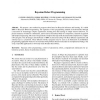Free Online Productivity Tools
i2Speak
i2Symbol
i2OCR
iTex2Img
iWeb2Print
iWeb2Shot
i2Type
iPdf2Split
iPdf2Merge
i2Bopomofo
i2Arabic
i2Style
i2Image
i2PDF
iLatex2Rtf
Sci2ools
105
click to vote
AROBOTS
2004
2004
Bayesian Robot Programming
We propose a new method to program robots based on Bayesian inference and learning. It is called BRP for Bayesian Robot Programming. The capacities of this programming method are demonstrated through a succession of increasingly complex experiments. Starting from the learning of simple reactive behaviors, we present instances of behavior combination, sensor fusion, hierarchical behavior composition, situation recognition andtemporalsequencing.Thisseriesofexperimentscomprisesthestepsintheincrementaldevelopmentofacomplex robot program. The advantages and drawbacks of BRP are discussed along with these different experiments and summed up as a conclusion. These different robotics programs may be seen as an illustration of probabilistic programming applicable whenever one must deal with problems based on uncertain or incomplete knowledge. The scope of possible applications is obviously much broader than robotics.
Related Content
| Added | 16 Dec 2010 |
| Updated | 16 Dec 2010 |
| Type | Journal |
| Year | 2004 |
| Where | AROBOTS |
| Authors | Olivier Lebeltel, Pierre Bessière, Julien Diard, Emmanuel Mazer |
Comments (0)

